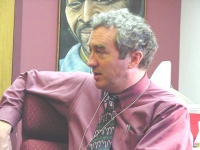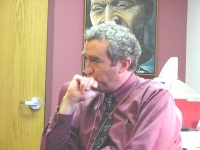Interview
with the Principal
Snee: ĎHonor Code Would Celebrate
Integrityí
By Juliana Pearson and Liz Twentyman
(January 14, 2002)
Lasso Online: Do you
support the implementation of an honor code?
Principal Snee: Generally speaking,
yes I do, for a number of reasons. I support some sort of mechanism whereby
we bring academic integrity to the forefront. You either have integrity
or you donít. You cannot select the classes in which you have integrity.
People who donít have integrity are capable of acquiring it. An honor code
will help.
Lasso Online: What
benefits do you think that we would gain by having an honor code?
 Principal
Snee: I have a great deal of respect for the intellectual community
of this school. The subject of integrity deserves attention and discussion.
An honor code would promote academic integrity. Although this is impossible
to legislate, it would celebrate and emphasize the positives of integrity.
The psychological benefits would be significant. The honor code would be
established after much discussion, after having an institutional discussion
about the honor code and the importance of having and maintaining integrity.
It will put these issues on the front of peopleís minds. Will it wipe out
cheating? Of course not. I donít think anyoneís that naive. Will it make
students stop and think before misconduct? I think so. If the honor code
changes even some behavior, it has done some good. If a student is caught
once and turns into a person of great academic integrity, thatís a great
story. Principal
Snee: I have a great deal of respect for the intellectual community
of this school. The subject of integrity deserves attention and discussion.
An honor code would promote academic integrity. Although this is impossible
to legislate, it would celebrate and emphasize the positives of integrity.
The psychological benefits would be significant. The honor code would be
established after much discussion, after having an institutional discussion
about the honor code and the importance of having and maintaining integrity.
It will put these issues on the front of peopleís minds. Will it wipe out
cheating? Of course not. I donít think anyoneís that naive. Will it make
students stop and think before misconduct? I think so. If the honor code
changes even some behavior, it has done some good. If a student is caught
once and turns into a person of great academic integrity, thatís a great
story.
Lasso Online: Under
the honor code, what would be the consequences for cheating?
 Principal
Snee: As rules are now, the consequence would be getting a zero for
the particular piece of work. We encourage teachers to report cheating
to guidance. Integrity is often a counseling issue, and I would like for
students caught cheating to have to speak with their counselor about the
matterówe can often learn a lot about the studentís life. Students who
engage in cheating rationalize their behavior and list pressures that theyíre
under. People cope with these pressures differently. Also, the report to
the counselor is important because sometimes there is not enough communication
between teachers about a student. Without this communication, we would
not know if someone is a habitual offender. Principal
Snee: As rules are now, the consequence would be getting a zero for
the particular piece of work. We encourage teachers to report cheating
to guidance. Integrity is often a counseling issue, and I would like for
students caught cheating to have to speak with their counselor about the
matterówe can often learn a lot about the studentís life. Students who
engage in cheating rationalize their behavior and list pressures that theyíre
under. People cope with these pressures differently. Also, the report to
the counselor is important because sometimes there is not enough communication
between teachers about a student. Without this communication, we would
not know if someone is a habitual offender.
I donít think there is only one right
answer [regarding what the consequences should be], and there isnít just
right and wrong. At what point do you say, ĎOkay, Iíve made a point with
this person who has chosen to do something wrong?í Where should the ramifications
end? Honestly, I donít know. Iíd like to see a forum to discuss this.
Lasso Online: Do you
think that the honor code should include a student honor council?
 Principal
Snee: I donít see having that at the high school level. Itís not that
we donít have students who are intellectually capable of handling it, but
thereís a huge difference between a high school and a college environment.
Asking high school students to sit in judgment of other high school students
is something Iím not prepared to ask. I donít feel that itís appropriate.
High school students are uncomfortable enough with the moral dilemma of
turning others in for cheating. It would be asking high school students
to do something they are not necessarily prepared to do. We would not ask
them to do such an onerous task. Also, from a legal standpoint, with respect
to protecting a studentís confidential record, we donít have the grounds
for establishing such a council. Principal
Snee: I donít see having that at the high school level. Itís not that
we donít have students who are intellectually capable of handling it, but
thereís a huge difference between a high school and a college environment.
Asking high school students to sit in judgment of other high school students
is something Iím not prepared to ask. I donít feel that itís appropriate.
High school students are uncomfortable enough with the moral dilemma of
turning others in for cheating. It would be asking high school students
to do something they are not necessarily prepared to do. We would not ask
them to do such an onerous task. Also, from a legal standpoint, with respect
to protecting a studentís confidential record, we donít have the grounds
for establishing such a council.
|

